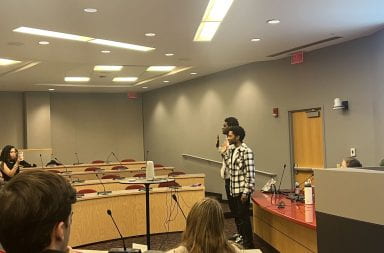Party down, dormitory residents – this quarter may be your last chance. At the end of spring quarter the Ohio State Resident Hall Advisory Council will make a decision on going “dry.”
“Dry” dorms would restrict residents – regardless of age – from possessing and consuming alcohol in the building, including their own rooms. As it stands now, those dorm residents who are 21 years and older are allowed to bring alcohol into the building and drink it with a few rules attached: They must have their room door closed, and no one under the age of 21 is allowed in the room at the time of alcohol consumption. If the provision in question is added to the policy, any student found drinking in the dorms would be documented, whereas, the current policy is to only document minors.
Georgetown University has “dry” dorms, but an initiative was submitted to student affairs in August to change the policy. It was based on the premise that most students living in university housing are under the age of 21, and therefore cannot consume alcohol according to state law. Stating the dorms are “dry” adds an extra law which is not needed, the group submitting the proposal said.
Other options are being explored by campuses in regards to drinking policies. Penn State is considering offering “dry” dorms. These residences would allow students a choice of living in an environment which does or does not allow drinking. This means those over the age of 21 would be allowed to consume alcohol if they are living in the correct buildings.
Going “dry” could be detrimental to the OSU residence halls. The policy would force older students – including graduate and transfer students – to choose other living options if desiring to excercise their legal rights. Furthermore, there is a potential to turn younger students away from living in the dorms if they feel the rules are overly intrusive. OSU would have very little say in the monitoring of a rise in underage drinking going on at fraternities, sororities and private houses.
Students who feel comfortable going to their residence advisors when there is a drinking problem may not have the same motivation to do so if the dorms are “dry.” This would include fear of alcohol poisoning as well as alcoholism. A lack of communication and trust has the potential to arise between students of all ages with those who hold authority.
There are, however, legitimate concerns regard to dorm drinking. Drunks can be loud and obnoxious whether they are of age or not. The noise can disturb people trying to study. Also, if there is a no-alcohol policy, those residents over 21 cannot bring beer and liquor into the building for those under 21.
OSU needs to realize, though, that a “dry” dorm policy would not curb underage drinking. Minors who want to drink in the residence halls will continue to find ways to do so. According to the OSU and state alcohol rules, minors are already being penalized and documented. If noise is a prevalent problem, OSU should consider the same option as Penn State. It should offer a “dry” dorm or “dry” floors in certain residence halls. This way those who want to get away from drunken noise would have an option and older students would keep their legal rights.


